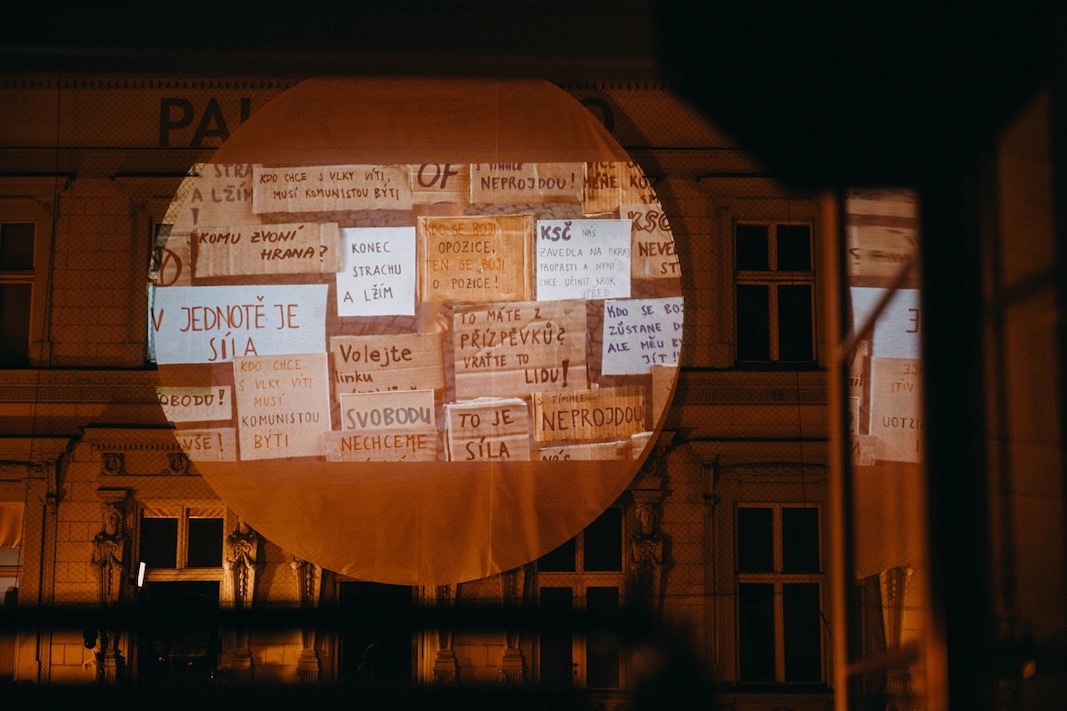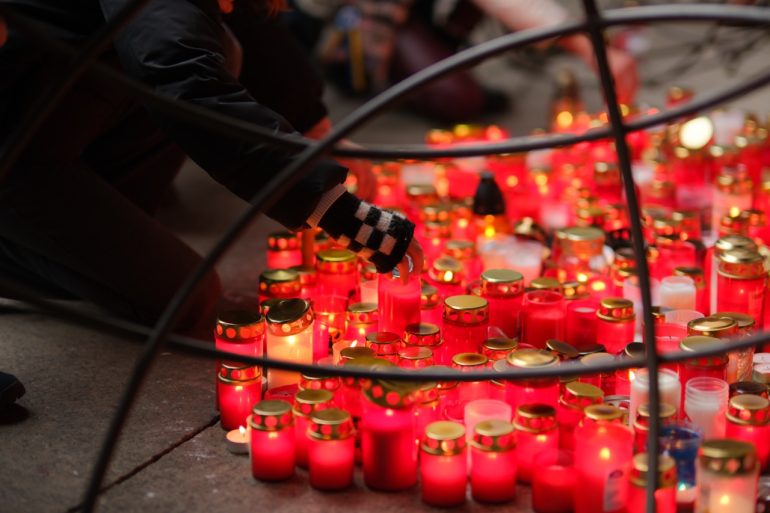Commemorative ceremonies took place across the Czech Republic yesterday to mark the 35th anniversary of the events of November 1989, which led to the fall of the communist regime and the restoration of democracy in Czechoslovakia, known as the Velvet Revolution.
Students, teachers and others commemorated the protests of November 1939 and 1989 near Prague’s Vysehrad Castle.
In previous years, the commemoration event was always held at Prague-Albertov, where students gathered on 17 November 1989, before their march to the city centre on Narodni trida was violently suppressed by the communist police. This year, however, it was held at Vysehrad because a research centre for three faculties of Charles University is being built at Albertov.
In their speeches, academics and students praised the courage and sacrifices of students in tense and difficult situations 85 and 35 years ago, as well as drawing attention to the major problems of contemporary society.
“Maybe we are not living in optimal times. Our country and society are facing many crises, and these crises often tend to divide us. We are often faced with evils that we cannot stop on our own,” Charles University Rector Milena Kralickova said in her speech. She added that people must not be afraid of accountability and must not be subject to any form of hatred, oppression or violence.
Czech Council of Universities chair Tomas Kasparovsky said that the past events are a reminder of the importance of free universities, which need to be supported. It is necessary to increase the capacity of universities, he said, because critical thinking is the best weapon against disinformation.
Michal Fernik, chair of the Student Chamber of the Council of Universities, listed a number of current problems: “No starter housing, low parental allowance, decentralised and underfunded higher education, an unsuccessful attempt at marriage for all, little support for entrepreneurship, heavy regulation, and no strategy for adaptation to climate change.”
The older generations of Czechs despise young people and label them as ‘snowflakes’ when they point out shortcomings and demand solutions, said Fernik. “This country obviously does not want to be for the young,” he added.
The crowd gathered at Vysehrad yesterday also heard the Czech and European anthems performed by students, and a speech by US ambassador Bijan Sabet.
The parade from Albertov in 1989, which became the impetus for the overthrow of the communist regime in Czechoslovakia, was itself a commemoration of International Student Day, marking the events of 1939 when the Gestapo arrested more than 1,000 students and teachers after protests against the Nazi occupation on the night of 17 November. Nine students judged by the Nazis to be leaders of the student organisations were executed on 17 November 1939.
Meanwhile, on Narodni trida in the centre of Prague, thousands of people watched the premiere of the short film ‘Svoboda nas spojuje’ (‘Freedom connects us’) on large screens, before listening to the traditional song ‘Prayer for Marta’, performed symbolically at 17:11 CET from the balcony of the Metro Palace by actress Anna Fialova.
The organisers of that event from the Diky, ze muzem (‘Thanks that We Can’) association told CTK that more than 93,000 people had come to Narodni trida to mark the occasion, according to data from the T-Mobile cell phone operator. Last year, about 80,000 people took part in the events on Narodni trida.
The film ‘Svoboda nas spojuje’, by Ester Valtrova, seeks to answer the question of what freedom means. It shows what happened after 17 November in different parts of the country, and how the protagonists from regions across generations perceive freedom today.
Other parades or demonstrations were also held to mark the Day of the Struggle for Freedom and Democracy. An event at the lower end of Wenceslas Square was intended to celebrate freedom but also to draw attention to the danger of Russian aggression. Its organisers also called for the introduction of the euro in Czechia and erected a gate on Na Prikope with the sign Make Europeans Dangerous Again.

Credit: Lukas Neasi
In the afternoon, a satirical carnival parade, Velvet Dawn, passed through Prague, with student groups in particular taking part. The aim of the parade is to comment on various social issues critically, but with humour and exaggeration. This year, the participants want to highlight issues such as the incoherence of Europe or the care of animals and the environment.
In the lower part of Wenceslas Square, the November 17 celebrations culminated with the Concert for Future. Tens of thousands of people arrived, according to the organisers. This year, its organisers called for people to discuss their differences and listen to each other with respect and understanding in order to prevent the division of society. presenter Jindrich Sidlo emphasised in his introduction that the event was not a political rally. “This is not a political rally for or against someone. This is a non-partisan event, a celebration of freedom, and freedom is here for everyone,” he said.
Representatives of Slovak culture were among the speakers, including Slovak National Gallery former director Alexandra Kusa and Slovak National Theatre former director Matej Drlicka, who both warned of the rise of the far right and populist nationalism. Slovak Culture Minister Martina Simkovicova dismissed Kusa and Drlicka earlier this year.
Counterpart events took place around the country, including in the centre of Brno, where hundreds gathered on Svoboďák to hear the Prayer for Marta at 17:11, followed by the anthems of the Czech Republic and Slovakia. The program will last for the next ten days and focuses on the theme of freedom and responsibility, reflecting the course of the 1989 revolution in Brno. The November 17th Festival in Brno will include speaking blocks, theatre performances, workshops at several locations, and yesterday a lantern parade.
There was also a connection between Prague and Brno via telebridge, providing a glimpse of what the celebrations in the other city looked like. “First of all, we want to actively follow up on the moment when the largest number of people in our history came together to let their voice be heard and change something in society thanks to it,” explained the festival dramaturg Sára Matůšová.
“We are happy that we managed to create this tradition in Brno and thus gain an important position for the city on the map of the celebration of democracy and freedom,” said festival manager Stano Čaban. “We are organising the largest festival in Moravia and the third largest in the Czech Republic.”







